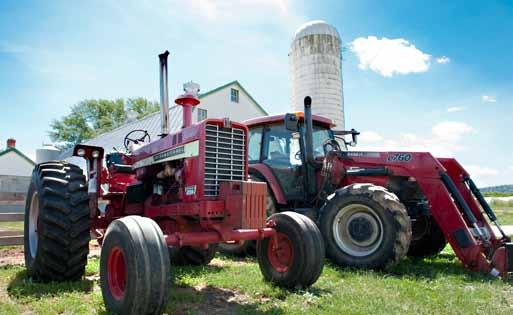
FS-1050 | June 2016
Protecting the Family Farm in Divorce

Nearly half of all U.S. marriages end in divorce, but how do divorces impact farmers? What can farmers do to protect their property and assets from the financial devastation of divorce? How can an extended family use estate planning to protect the family farm from divorce?
Prenuptial Agreements Can Protect Farm Assets in a Divorce
One of the best ways farmers can protect farm property and assets from the financial ravages of divorce is through a valid prenuptial agreement. A prenuptial agreement is a simple document prepared by a qualified attorney stating which assets in a divorce will be divided and which will remain non-marital or not subject to division.¹ Both men and women with significant assets such as property, valuable equipment, business interests, or substantial retirement savings should consider a prenuptial agreement when marrying. A prenuptial agreement should contain a full disclosure of assets with approximate values. Parties who challenge prenuptial agreements often claim they were unaware of the full extent or value of the assets involved.
A valid prenuptial agreement cannot be substantively or procedurally unconscionable.² An unconscionable agreement is characterized by extreme unfairness.³ A substantively unconscionable agreement leaves the person signing it with few to no rights. For example, if a party to a prenuptial agreement waives the right to certain land, but retains the right to seek alimony and/or a monetary award upon divorce, the prenuptial agreement will most likely not be viewed as substantively unconscionable because that party retained some valuable rights.⁴
A simple way to avoid a procedurally unconscionable prenuptial agreement is to negotiate the agreement well before the wedding to allow sufficient time for both people to hire an attorney to explain the terms.⁵ A valid prenuptial agreement is entered into freely and with full understanding of its terms.⁶ A prenuptial agreement given to a bride or groom the day before the wedding can be voided because there was insufficient time for legal counsel to assist with understanding and/or negotiating the terms. Although it is not required for the person signing a prenuptial to seek legal counsel to review the agreement, it is highly recommended.⁷
A prenuptial agreement like all other legal documents can face legal challenge; however, if drafted and executed correctly, it can be a very powerful shield to protect assets from the division associated with divorce. To protect property and/or assets after marriage, it is possible to enter into a post-nuptial agreement, as long as the agreement is a valid contract.
If drafted and executed correctly, a prenuptial agreement can be a very powerful shield to protect assets from the division associated with divorce.
Determining Marital and Non-Marital Property Is a First Step
When contemplating divorce, it is important to understand what property is marital (shared property which needs to be divided) and what is non-marital (property solely owned by one spouse and not subject to division). Under Maryland law, marital property, however it’s titled, is acquired by one or both parties during marriage (including land), unless excluded by valid agreement.⁸ For example, one spouse’s workrelated retirement savings accumulated during marriage, is marital property subject to division. By contrast,non-marital property is 1) acquired before the marriage, 2) acquired either before or during the marriage by inheritance or gift, 3) excluded by valid agreement such as prenuptial agreement, or 4) directly traceable to any of these sources.⁹
Spouses often unintentionally blur the lines between marital and non-marital property. Property might start out as completely non-marital, but can quickly become partially marital. For example, if Mary owned 50 acres of farmland before marriage, it is clearly non-marital property. However, if after marriage Mary and her husband use marital funds to improve the farm and purchase additional acreage, the spouses have created a marital interest in the farm. In this example, Mary could have avoided creating the marital interest with a legally binding prenuptial agreement, or by not using marital funds to improve and expand the property.
It is important to note that the legal principles related to marital property continue until a legal divorce is final. For example, if spouses have been separated for 10 years but are not legally divorced and one spouse buys a piece of farmland, the property is marital and the nonpurchasing spouse has a marital interest by virtue of the spousal relationship.
Use Estate Planning to Protect the Farm from Divorce

To keep a farm within a family and protect it from sale or division in a divorce, all bequests should be made solely to the blood relative as opposed to the relative and spouse. If the blood relative inherits an ownership interest in the farm, it will be a non-marital interest which cannot be sold or divided in a divorce. However, a person who inherits property can create a marital property interest if he or she retitles or gifts the inherited property to a spouse or uses marital funds to maintain or improve the property. Alternatively, utilizing a trust as an estate planning tool can ensure children or grandchildren, rather than spouses, inherit the family farm and can prevent the commingling of inherited assets with marital assets.
Typically, the best chance a farm operation has to survive a divorce is if the spouses can voluntarily agree on dividing marital property rather than asking a court to make the decision.
Prevent Division of Property by Avoiding Litigation
Typically, the best chance a farm operation has to survive a divorce is if the spouses can voluntarily agree on dividing marital property rather than asking a court to make the decision. Divorcing spouses should come to a voluntary division of their marital property and outline those terms in a marital settlement agreement or similar document using attorneys and/or a mediator. The Maryland Department of Agriculture offers an Agricultural Conflict Resolution Service (ACReS) mediation program which can be used for valuing marital property when the spouses have issues regarding agricultural credit or lending or USDA-related programs and loans.
Without Voluntary Agreement, Court Will Value and Divide Marital Property

If spouses cannot voluntarily agree on the value and division of marital property, then a judge must determine what property is marital, the value of the property, and whether to divide the property or equalize the assets by ordering a monetary award, or both.¹⁰ Alimony is handled separately from the valuation and division of marital property, but is part of the overall consideration. Dividing marital assets in a farm family can be challenging because typically the wealth is tied up in land or farm-related infrastructure or equipment, leaving limited liquid assets to be easily divided or used to form the basis of a monetary award.
When deciding the amount of a monetary award or the terms of property division or transfer, the court considers a multitude of factors outlined in the law.¹¹ Although most judges consider the nature of farming operations and try not to issue orders which would destroy an operation, their role is to value and divide marital property and equalize the parties’ assets. Consequently, judges cannot always divide property without the couple having to sell or divide farm-related property and/or assets. When faced with a potential sale of farmland or equipment, an individual may prefer to 1) offer a spouse alimony which prolongs the financial commitment of divorce but may prevent an immediate division of assets, or 2) offer a buy-out of the spouse’s interest spread out over a course of years.
Court Will Consider Spouses Marital and Non-marital Debt
When considering the economic circumstances of each spouse, the court will also consider their marital and non-marital debt. A marital debt is directly traceable to the acquiring marital property.¹² By contrast, a nonmarital debt is not directly traceable to the acquiring marital property, such as premarital student loan debt.¹³ If one spouse attempts to get rid of marital assets or lower the value of marital assets through debt or otherwise, in anticipation of a divorce, this is considered a dissipation of marital assets and is not viewed favorably by the courts. Protecting the family farm from divorce is possible if farmers plan ahead with a valid prenuptial agreement, understand the legal parameters of marital vs. non-marital property, limit bequests to family members, and are able to come to a voluntary division of marital property, rather than asking a judge to value and divide the assets.
- ¹Md. Code Ann., Fam. Law §8-201(e)(3)(iii).
- ²Stewart v. Stewart, 214 Md. App. 458, 470 (2013).
- ³Id. at 477.
- ⁴Id. at 472-473.
- ⁵Id. at 474-475.
- ⁶Id.
- ⁷Id.
- ⁸Md. Code Ann., Fam. Law §8-201(e)(1)(2).
- ⁹Md. Code Ann., Fam. Law §8-201(e)(3).
- ¹⁰Md. Code Ann., Fam. Law §8-205(a)(1).
- ¹¹Md. Code Ann., Fam. Law §8-205(b).
- ¹²Schweizer v. Schweizer, 301 Md. 626, 636 (1984).
- ¹³Id. at 637.
| SARAH EVERHART Legal Specialist Severhart@law.umaryland.edu University of Maryland Francis King Carey School of Law 500 West Baltimore Street, Baltimore, MD 21201 (410) 706-7377 This publication, Protecting the Family Farm in Divorce (FS-1050) is a part of a collection produced by the University of Maryland Extension within the College of Agriculture and Natural Resources. The Agriculture Law Education Initiative (ALEI) is a collaboration of the University of Maryland Francis King Carey School of Law at the University of Maryland, Baltimore (UMB); the College of Agriculture & Natural Resources at the University of Maryland, College Park (UMCP); and the School of Agricultural and Natural Sciences at the University of Maryland Eastern Shore (UMES). ALEI is an initiative of the University of Maryland: MPowering the State, a strategic alliance between UMB and UMCP created in 2012 to significantly expand research, business development, and student opportunities at both universities. The information presented has met UME peer-review standards, including internal and external technical review. For help accessing this or any UME publication contact: itaccessibility@umd.edu For more information on this and other topics, visit the University of Maryland Extension website at extension.umd.edu University programs, activities, and facilities are available to all without regard to race, color, sex, gender identity or expression, sexual orientation, marital status, age, national origin, political affiliation, physical or mental disability, religion, protected veteran status, genetic information, personal appearance, or any other legally protected class. |